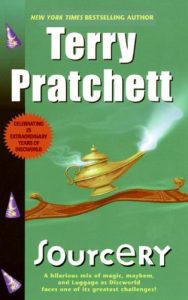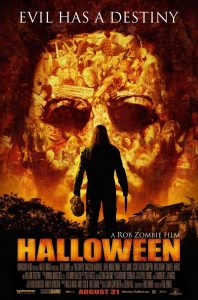 Have I been going crazy with the Star Wars books? Apparently! And I doubt I’m likely to slow down much anytime soon, despite an intention to space them out at least minimally. It helped for this one that I spent a solid day at the airport, of course. It would have been only a bit over half a day, except that I traded my seat on a plane for a free round trip voucher. That kind of behavior is, of course, completely awesome, because it means I get to fly somewhere else now, but for free. And since I seem to make quite a few of these trips, that is definitely a good thing.
Have I been going crazy with the Star Wars books? Apparently! And I doubt I’m likely to slow down much anytime soon, despite an intention to space them out at least minimally. It helped for this one that I spent a solid day at the airport, of course. It would have been only a bit over half a day, except that I traded my seat on a plane for a free round trip voucher. That kind of behavior is, of course, completely awesome, because it means I get to fly somewhere else now, but for free. And since I seem to make quite a few of these trips, that is definitely a good thing.
Also a good thing, though, is having a Star Wars book to read while sitting around the airport. I mean, if it’s a good one. But it’s cool, because Bloodlines was. There was plenty and more involving the brink of civil war and the growing Sith menace I mentioned regarding the last book, about which more later; but the story the author really wanted to tell was a familial yarn about Boba Fett and his family. (Apparently, he had a family once aside from his father, which I was not previously aware of either, and yes, the extended universe authors brought him out of the Sarlacc alive years and years ago. (And if you don’t know what that means, then probably the book and the review alike are not for you. But it does have good themes, nevertheless, about which also more later.)) Said yarn is reasonably decent, but largely uncompelling outside the greater framework in which it was placed. Inside that framework, which has Fett’s family in microcosm, the galactic “family” in macrocosm, and the Solo-Skywalker family in, um, cosm all three parallely coming apart at the stress-ridden seams and for the same basic reasons, well, it’s damned compelling indeed. And just like in real life, for contradictory reasons at that. Putting on blinders to protect yourself from seeing who people really are, but also ascribing antagonistic motives to people too easily; taking the easiest path available without addressing the hard questions at the core of it all, but also being so paralyzed by trying to address hard questions that the easy solutions slip by; failing to account for the impact our past has on our future, but also focusing on the past too closely to keep track of the important things in the present. Which is all vague and high-handed frippery, really, but I like a book that makes me pause and think and also want to shake the characters to get them to see sense. And I especially like a book that lets me accept that sometimes sense isn’t there to be seen: that senselessness happens too, and all we can do is start getting ready to pick up the pieces after the storm has passed.
Yeah, and I didn’t really plan to write any of that. There was the “family in crisis” parallels, and after that I was done except for this one last thing. But apparently I liked the book better than I thought, if all that came spilling out. So that’s cool. But mostly, I wanted to talk about the Sith bit. As much as I liked the tragic fall of Anakin Skywalker, the one thing this series is excelling at is schooling George Lucas in what it means to write about Star Wars. Because these three authors (well, admittedly only two so far) are going above and beyond on providing a plausible Sith conversion. For Anakin, certainly the Jedi worked very hard at pushing him into the position he found himself, but without a huge gaping flaw in his character, the Sith Lord could never have won him over. But <spoiler averted>’s story is completely different from that. Every individual step taken has made sense rationally, and most of them are even steps I would have agreed with. There were a couple of obvious blind spots where selfishness trumped rationality, but even then, it only caused a bad but rational step, not a truly irrational one. Admittedly, I’ve been troubled by aspects of the character in question for about the previous ten books, but it’s really impressive to behold a basically likable character transform into a disturbing sociopath over the course of just two books, during which I agree with the majority of his individual actions. The upshot of all of which is, this is going to be a really ugly and disturbing story, before it’s all over. But also probably very good.
 I’m kind of stuck here, trying to make up my mind how I feel about the conclusion of the Girls series, other than accomplished at having completed it. I liked the interpersonal relationship changes. All the flaws and annoyances and dislikes were finally sorted out, after watching everyone remain static for the first three books. I mean, not everyone grew up or got better, but that’s to be expected. It was just nice to see the characters finally change at all, for good or ill. Trauma is supposed to do that, and this very clearly was traumatic. Being trapped away from the world, stalked by sex-starved alien clones, unable to trust anyone around you due to the gender inequity of the situation? I know it sounds awesome, but I’m convinced that some thousand-yard stares are going to result.
I’m kind of stuck here, trying to make up my mind how I feel about the conclusion of the Girls series, other than accomplished at having completed it. I liked the interpersonal relationship changes. All the flaws and annoyances and dislikes were finally sorted out, after watching everyone remain static for the first three books. I mean, not everyone grew up or got better, but that’s to be expected. It was just nice to see the characters finally change at all, for good or ill. Trauma is supposed to do that, and this very clearly was traumatic. Being trapped away from the world, stalked by sex-starved alien clones, unable to trust anyone around you due to the gender inequity of the situation? I know it sounds awesome, but I’m convinced that some thousand-yard stares are going to result. It’s been a while, here. Not for lack of reviewing, but my consumption has dropped dramatically, and I have no idea why. Don’t expect it to last. (For one thing, there’s another
It’s been a while, here. Not for lack of reviewing, but my consumption has dropped dramatically, and I have no idea why. Don’t expect it to last. (For one thing, there’s another 
 [Note: I’m not concerned about spoiling the 1978 movie, because, come on. but I’ve found it impossible to discuss the remake without going in depth, so below the cut, expect heavy spoilers.]
[Note: I’m not concerned about spoiling the 1978 movie, because, come on. but I’ve found it impossible to discuss the remake without going in depth, so below the cut, expect heavy spoilers.]
 My zombie serial has become a soap opera. (Although in the historically literal meaning of the term, that’s still not true. I can at least still count on the zombies to be rotting, putrid shambles of people who are completely unbathed over the past year of their new existences.)
My zombie serial has become a soap opera. (Although in the historically literal meaning of the term, that’s still not true. I can at least still count on the zombies to be rotting, putrid shambles of people who are completely unbathed over the past year of their new existences.)
